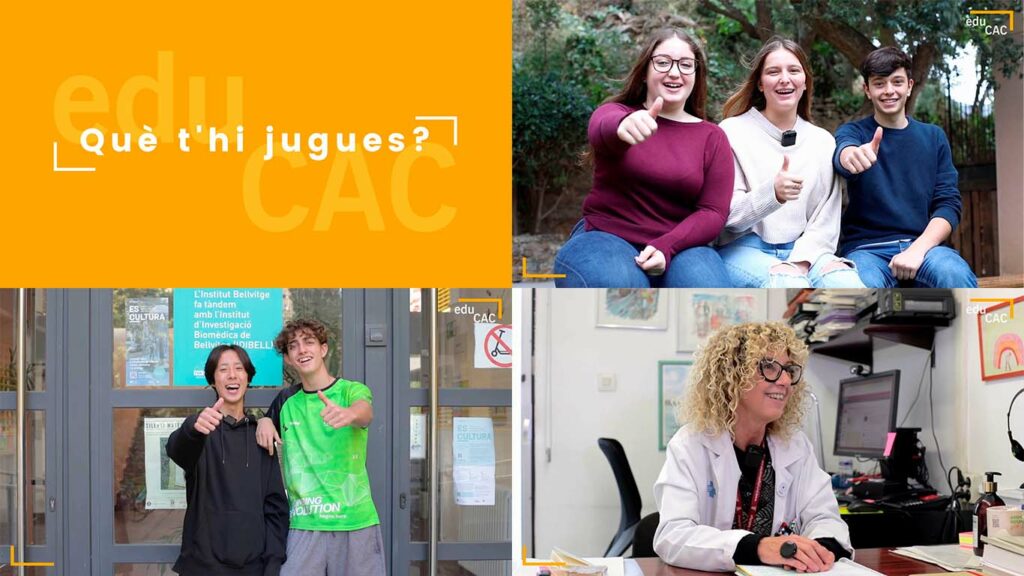A pilot test carried out in two ESO institutes in the Barcelona metropolitan area shows that introducing educational programs into classrooms prevents addiction to video games and gambling, as well as raises awareness among adolescents and teachers about the risks.
The didactic unit What do you bet? Has been tested in two educational centers (Escola Virolai and Institut Bellvitge, aimed at students in 3rd and 4th ESO. The activities, designed to be implemented in the classroom, are programmed based on the competencies of the Culture and Ethical Values field of the secondary school curriculum.
The didactic material has been created by the Audiovisual Council of Catalonia (CAC), through the eduCAC program, within the framework of a scientific study by the research group on Psychoneurobiology of Eating Disorders and Addictive Behaviors of the Bellvitge Biomedical Research Institute (IDIBELL) and the Bellvitge University Hospital (HUB).
The educational contents of the project, which was presented a year ago, have undergone an intervention and piloting phase in the two educational centers mentioned.
Two groups of students have been defined in each center, an experimental group, and a control group, depending on whether or not they have participated in the intervention in the classroom. Both groups responded to questionnaires at the beginning and at the end of the piloting that have been analyzed by the clinical professionals. The students of the experimental group, after working on the contents, have produced audiovisual products in which they integrate reflections and knowledge about what they have learned. Some have opted for narrating video game games adopting different roles (casters, players), and others have chosen podcasts.
Once the pilot was finished, the HUB’s Pathological Gambling unit analyzed the data to draw conclusions and the eduCAC program modified the didactic unit based on the assessments of the teachers who participated in the pilot.
Regarding the results and concerning video games, it has been observed that:
- The intervention in the classroom through the activities of the eduCAC didactic unit implies a reduction in the intensity and frequency of video game use. Before the intervention, about 24% of the students played between 5-7 days a week. After the intervention, the same percentage is over 4%. This finding confirms that the didactic unit has positive effects on prevention.
- The factors that increase the risk behaviors to become addicted are being a boy and making intensive use.
Regarding gambling, it has been observed that:
- After the intervention, the students identify better risk behaviors and problem behaviors associated with gambling.
- Often, students normalize the game with scratch cards, bingos, poker, etc., and do not include/do not recognize these practices in gambling.
- Age (the older, the greater the risk), the degree of cognitive distortions associated with the game, and the intensity of video game use are risk factors.
It should be noted that in all cases the student self-reported the data, which means that the students themselves consider that they meet certain criteria or not, but it is not a clinical diagnosis.
The results have been presented in September to the management teams and the teachers of the Bellvitge Institute and the Virolai School. During the session, the educational centers were informed that the HUB’s Pathological Gambling Unit offers an advisory service to the families of the students who have participated in the project.
On the other hand, from the eduCAC program, the didactic unit What do you bet? has been modified based on the teachers’ assessments: resources and tools that have worked in the classroom have been included; some activities have been reconsidered to improve their understanding and application in the classroom, and some proposals have been redistributed. The result is a didactic unit validated by teachers that shows that media education works to favor a critical and responsible consumption of audiovisual content.
The unit was presented on December 17, 2021, at the College of Journalists, in a press conference in which the coordinator of the Pathological Gambling Unit of the Bellvitge University Hospital and IDIBELL principal investigator Susana Jiménez Murcia participated.
Jiménez said that “in 2005 only 2% of the patients who requested treatment at the Unit were between 16 and 21 years old, during 2021 this rate has increased to 9.5%.” Of all these adolescents, 26.4% attended due to problems with the use of video games and 63.6% due to gambling addiction. And, more specifically, 52.4% are due to strategic-type games, such as sports betting.
“The average age, when they come to the consultation, is 19 years and the evolution of their disorder is very fast, about a year and a half, and almost 40% of them already accumulate debts,” she said. Concerning the effect of the pandemic, “comparing data from before and after confinement, it has been identified a decrease in age and a higher study level, at the time of the consultation, as well as an increase in cases of addiction to video games”.
The didactic unit What do you bet? It is available on the eduCAC website and it is included in the content offered by the eduCAC program in schools for media education in the classroom.
The Bellvitge Biomedical Research Institute (IDIBELL) is a biomedical research center created in 2004. It is participated by the Bellvitge University Hospital and the Viladecans Hospital of the Catalan Institute of Health, the Catalan Institute of Oncology, the University of Barcelona and the City Council of L’Hospitalet de Llobregat.
IDIBELL is a member of the Campus of International Excellence of the University of Barcelona HUBc and is part of the CERCA institution of the Generalitat de Catalunya. In 2009 it became one of the first five Spanish research centers accredited as a health research institute by the Carlos III Health Institute. In addition, it is part of the “HR Excellence in Research” program of the European Union and is a member of EATRIS and REGIC. Since 2018, IDIBELL has been an Accredited Center of the AECC Scientific Foundation (FCAECC).

